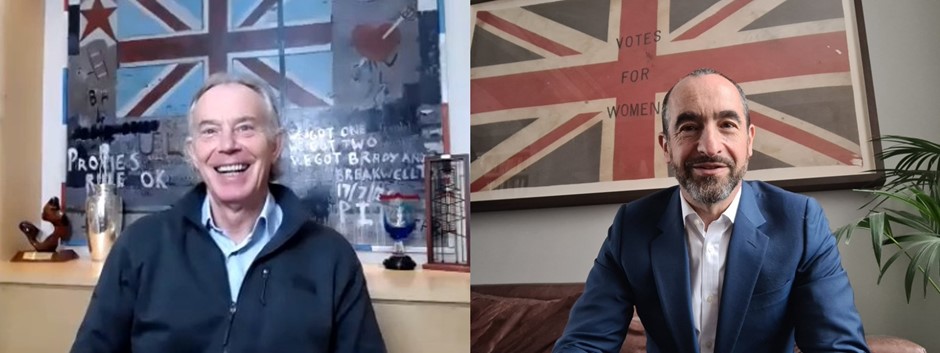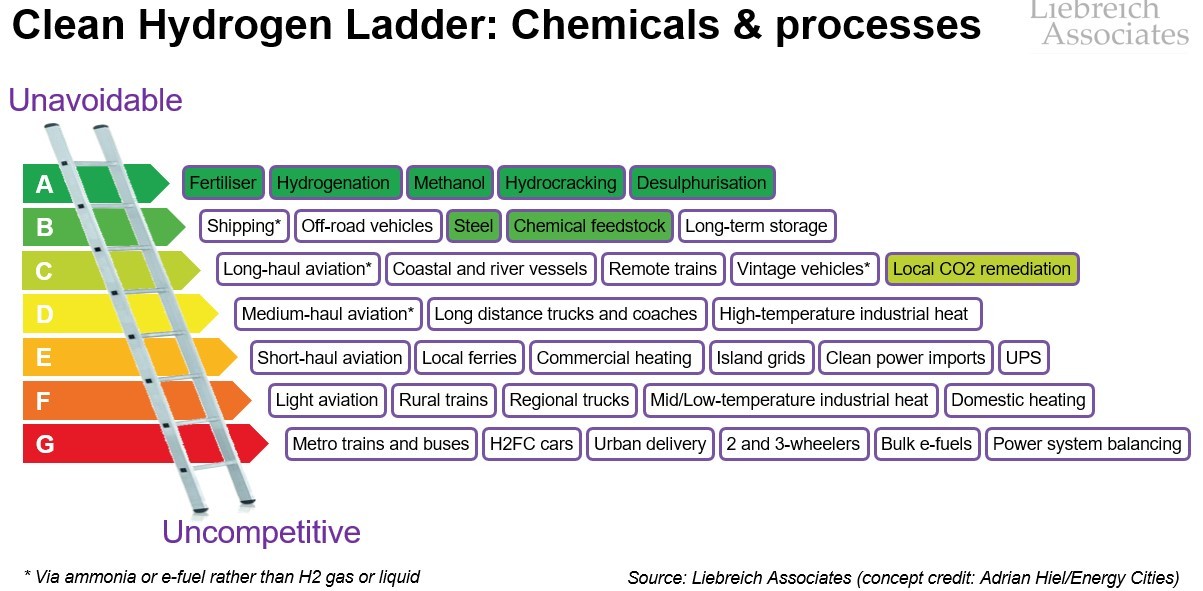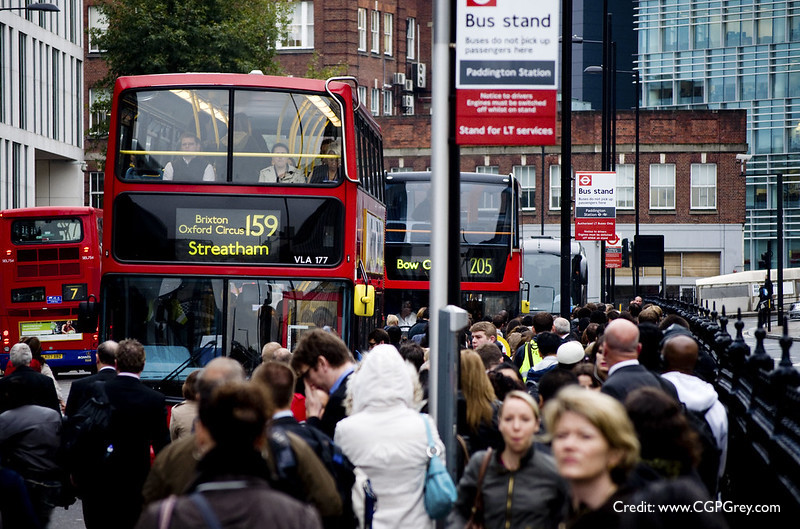Q1 2021 Newsletter: Unusually busy – some very big news!
Although the pandemic is still raging across Europe and much of the world, data from the UK, Israel and other vaccine leaders shows that there is light at the end of the tunnel. We all need to start preparing for life after Covid, which will be strangely familiar, yet utterly different.
I got back to London at the end of February as the schools reopened and have now had my first shot of the vaccine. It has been an unusually busy time, even by my standards.
Along with the usual summary of stuff I have written, media appearances and an angel portfolio update, this newsletter contains some really big news:
- I will be kicking off Season 3 of Cleaning Up, tomorrow Wednesday 14 April, with a conversation with Tony Blair;
- A group of us have rented a historic estate outside Glasgow throughout COP26 in November and will be running something we are calling CASC: the Climate Action Solution Centre;
- And I’m starting a new business!
Read on for details…
Cleaning Up

Season 3 of Cleaning Up will be kicking off with a conversation with Tony Blair – Wednesday 14 April, 6pm BST
Season 2 of Cleaning Up came to a close just before Easter, after another series of fantastic conversations:
- Baroness Bryony Worthington (lead author of the UK’s 2008 Climate Change Act and now co-director of the Quadrature Climate Foundation), Lord Zac Goldsmith (Minister for the Pacific at FCDO and Minister for the environment at DEFRA) and Emma Howard Boyd (chair of the UK Environment Agency) provided the UK political perspective in this critical post-Brexit, COP26 year. Teresa Ribera (Deputy Prime Minister of Spain and Minister for the Ecological Transition and Demographic Challenge) gave us the perspective from the continent.
- Beverley Gower-Jones, Managing Partner at the Clean Growth Fund, talked about how she’s funding the future of low-carbon energy, and Greg Jackson (Founder and CEO of Octopus Energy) talked about how he’s building it, in what is turning out to be one of our most popular episodes to date.
- Dr Fatih Birol (Executive Director of the International Energy Agency), Professor Steven Chu (one of two Secretaries of Energy under President Obama – the other being Professor Ernie Moniz, whom we heard from in Episode 17), and Kristian Ruby (Secretary General of Eurelectric, an association of over 3500 companies making up the European power sector) shared their insight into the challenges of transitioning the energy system to net zero.
- We had not one but two former UK energy ministers, Claire Perry O’Neill and Amber Rudd, reminiscing about their time in government, between them having delivered the UK’s signature of the Paris Agreement, the country’s Clean Growth Strategy, the coal exit and its world-leading legal commitment to net zero.
- Kate Hampton (CEO of Children’s Investment Fund Foundation) described how she goes about giving away more than $380 million per year in philanthropic grants, and Professor Jim Skea (Co-Chair of Working Group III of the IPCC), talked us through the sausage-making of how IPCC reports actually get put together, hinting heavily that my bugbear, the implausibly extreme RCP 8.5 scenario, is going to get a thorough kicking in the upcoming Sixth Assessment Report, due out next year.
- We also did a special compilation for International Women’s day to showcase some of the great women climate leaders we have had on the show. My thanks again go to Pietrojan Gilardini and the Gilardini Foundation for their support in making Season 2 of Cleaning Up possible.
Season 3 of Cleaning Up will be kicking off on Wednesday 14 April with Tony Blair, UK Prime Minister from 1997 to 2007, now Executive Chair of the Tony Blair Institute. Don’t miss it – 6pm BST (7pm CET, 1pm EST, 10am Pacific) on YouTube and all good podcast platforms!
If you are a fan of Cleaning Up, please spread the word: tell your friends, give us likes, thumbs up and reviews, and share your thoughts on social media. We have no marketing budget so our reach depends entirely on people like you.
If you have not yet tuned in to Cleaning Up, please do so! You can subscribe to the YouTube channel or listen on any good podcast platform like Spotify, Apple Podcasts, PocketCasts or Google Podcasts.
Electric Ferries
We don’t usually write reports at Liebreich Associates. But when the InterAmericas Development Bank (IADB) asked me to do a deep dive into electric ferries, I couldn’t say no – it is such an interesting sector.
The result is the 88-page Opportunities for Electric Ferries in Latin America, which concludes that many routes could go electric today, because although the capital cost would be higher than for diesel, operating cost would be much lower. And, as batteries get cheaper and more dense, longer pure-electric routes will become feasible – up to 100 km round trip for large ferries and 400km for fast catamarans by 2040.
For Latin America this represents a potential $6.8 billion value chain opportunity by 2040 – and that is just ferries, not including other types of electric vessels.
Opportunities for Electric Ferries in Latin America is free to download here.
Sustainable Finance
I still write for BloombergNEF four times a year, and my piece this quarter was all about sustainable finance.
Climate and Finance – Lessons from a Time Machine starts with a look back to the bad old days of 2012, when the financial system was “institutionally fossilist”, with investment decisions biased toward incumbent, fossil-based technologies despite the rapidly improving economics of clean energy.
It reviews the smorgasbord of over 50 international organisations now pushing, pulling, pledging or promoting climate finance across the financial system – from civic society through to central banks, via index providers, asset owners and managers, banks, insurers, standards providers and financial accounting bodies.
Next, it gets stuck into the weakness of current carbon accounting approaches – all are based on Scope 3 emissions which cannot be aggregated into portfolios because of double-counting – and of the EU Taxonomy, which is arbitrary, reductive, administratively cumbersome and intrusive.
I don’t want to suggest that the current surge of interest in sustainable finance is entirely misplaced – far from it. It is absolutely vital, if we are to address climate change and other planetary environmental challenges. The sector just needs to mature, its methodologies need to be strengthened and its institutions to find their feet.
I finish with four promising areas for action:
- Reform of the Greenhouse Gas Protocol and Scope 3;
- Embedding climate risk in financial accounting rather than ESG reporting;
- Allocating responsibility for emissions to the players who make the decisions that cause them;
- Focusing on the only two things that matter: driving down emissions and removing carbon from the atmosphere – rather than nonsense like monetising avoided emissions.
Climate and Finance, Lessons from a Time Machine can be found here, free to read.
Sustainable Trade
I’m starting to get into the swing of things with the Board of Trade, participating in a number of virtual visits and round tables and attending our second virtual meeting. Roll on the end of the lockdown, when we will start doing Board of Trade meetings around the country.
Early March saw the publication of our first report, Global Britain, Local Jobs.
In it we describe how an export-led recovery will bring benefits across the UK, pushed for new trade deals going beyond the old EU ones, and voiced our support for modernisation of the World Trade Organization.
The report didn’t go quite as far as acknowledging that net zero is the de facto overarching goal of UK economic policy – that will take time to sink in – but I was delighted to see green trade embedded throughout the document.
The next Board of Trade report is going to focus on Green Trade.
I’ve also participated in a number of events on trade and sustainability, such as this high-level WWF/Chatham House round table on 28 January (my main remarks start here). On 23 March, I participated in a very lively panel on the role of free trade in supply chain resilience at the Department for International Trade’s Business of Resilience Conference.
Net zero
Over the past few months, I have participated in a number of excellent events on energy and net zero, including the following:
- 21 January, an excellent Atlantic Council Energy Summit 2021. I was part of a panel discussion on how the Biden administration can build a better coalition on international energy and climate policy in a post-COVID world.
- 11 February, the UK Institute for Government’s online discussion on “Delivering Net Zero”. My panel was on “What do governments need to do”. My rant about how we have to listen to front-line heating engineers – not just to policy wonks and people like me – went somewhat viral, much to the amusement of my new “heat punk” friends at betateach.
Climate Tech Noodle
The 5th Climate Tech Noodle took place on 9th March. For those not (yet) invited, this is a quarterly informal Zoom call for senior leaders in climate technology innovation. Each Noodle consists of two sessions, one on a sector and one on an aspect of the acceleration ecosystem.
March’s Noodle took a deep dive into some new frontiers in biology and genetics with Edward Perello, Associate Director for Agriculture at Deep Science Ventures, followed by a primer on carbon offset markets with Guy Turner, former head of carbon and chief economist at New Energy Finance/BloombergNEF.
If you want to know more about future Noodles, contact Piotr Pajda at Liebreich Associates.
Angel Portfolio News
- Zeelo. When I first met Sam and Barney, Zeelo’s revenues were around £10,000 per month; I turned down the investment as too early. Six months later they came back with a £100,000 month, and I invested. Now, they have just done their first £1,000,000 month. If only all my angel companies could do that!
- Cypher Coding. The year has started with masses more press coverage for amazing CEO, Elizabeth Tweedale. Cypher is just launching a crowdfunding on Seedrs, so the parents of kid coders can have some skin in the game.
- Chargepoint. After a bit of a delay, Chargepoint’s SPAC was completed, so the stock is now trading as CHPT. The price has been volatile and I’m still locked in, so I’m just watching and waiting – and keeping an eye on President Biden’s $2 trillion infrastructure plan!
- Eavor Technologies. This quarter saw John Redfern secure a $40m investment from BP, Chevron, Temasek and others, in what may have been the oil sector’s most significant move in geothermal in a decade. What can I say, very exciting.
- Xlinks. A new investment for me – XLinks is building 10 GW of solar and wind in Morocco, 25GWh of batteries and a subsea HVDC cable to import 3.6GW of affordable, dispatchable renewable electricity to the UK. It sounded like a mad plan when I first heard of it, but I have been convinced by the economic modelling and the professionalism of the team.
- What3Words. Raised just under £12m from Ingka Investments, part of the group that owns IKEA. Will help improve customer satisfaction and reduce carbon footprint of home deliveries, particularly as IKEA expands into countries with poor street address integrity.
- Clean Growth Fund. OK, it’s not a portfolio company – I am only an advisor – but congratulations to Beverley Gower Jones and her team, who completed their first two investments in smart energy company Piclo and smart charging company Indra.
CASC – the Climate Action Solutions Centre for COP26
Over the past few months, I have put together a consortium to rent a stunning historic venue just outside Glasgow, for the entire two weeks of the upcoming UNFCCC COP26 climate summit in November to run a series of events, dinners and whiskey tastings.
While there is still plenty of uncertainty about the exact form COP26 will take, because of Covid, I’m in little doubt it will go ahead. With UK cases right down and the vaccine apparently working, there is no way the UK and Scottish governments are going to miss the economic and PR opportunity!
CASC – the Climate Action Solution Centre – will host a programme of presentations, round-table discussions, workshops and dinners (and some whiskey tastings) around the theme of delivering on climate pledges: it’s great that so many countries and organisations are committing to net zero, but we want to help them front-load the problem-solving that will be required for them to get there.
I’ll be providing more information in future newsletters, but meanwhile, if you think your organisation might want to be part of CASC, do get in touch!
Did I mention the whisky tastings?
My new business – EcoPragma Capital
Since the start of the year, I have been working with a friend of mine from HBS, Henry Lawson, to put a bit of structure around my investment activities and how I work with growth companies. We have now decided to launch EcoPragma Capital LLP, offering a range of services to investors and companies.
Henry Lawson and my early careers were very similar – Cambridge engineering, HBS and strategy consulting. But, while I skied in the Olympics and then dived into the low-carbon transition, Henry went off to play a leading role in the digitisation of businesses and markets using SaaS, Cloud, machine learning and data science – technologies that are now helping to transform the energy, transport, industry, built environment, infrastructure and agriculture sectors.
Having sold his most recent start-up, Henry and I met online to chat about his deep green property renovation and knock around ideas for his next business. The timing was excellent: one thing led to another and the idea for EcoPragma Capital was born.
As we entered this critical decade, each year around $4.4 trillion is invested in the capital assets that decide the world’s GHG emission trajectory. Of this, just $1.2 trillion is compatible with net zero. We therefore very rapidly need to shift $3.2 trillion from high-carbon to net-zero-compatible solutions.
This means not just massive disruption to investment flows in infrastructure, it also represents a massive opportunity in growth equity. According to the IEA, around a quarter of emissions could be eliminated by technologies that are already mature; technologies to address another quarter of emissions don’t yet exist; that leaves half of global emissions to be eliminated by technologies that are somewhere between the lab and maturity. They are going to need a whole lot of capital, and a whole lot of help.
It is too early to reveal the exact products and services EcoPragma Capital will be offering. But I will guarantee one thing, it will be ambitious!
If you are interested in being part of the EcoPragma Capital journey, there are three things we are looking for right now:
- Investable opportunities – in particular those in growth equity: companies that have already achieved product-market fit and revenue momentum, but which need capital and could benefit from help from either my network or in navigating the digitisation wave;
- Investors – in particular, family offices and institutional investors looking to put substantial funds to work in the technologies and solutions associated with net zero;
- People – in particular investors with 10 to 20 years’ experience in venture capital or private equity, or growth equity bankers.
To find out more about EcoPragma Capital and to get involved, email me!
* * *
So there you have it. Another busy quarter, plenty of activity, plenty of news.
Stay healthy and safe, this pandemic is not over. And I’ll check back in with you this summer!
Michael
Terms of use: photos and other media may be used exclusively for the purpose of publicising an upcoming or past event involving Michael Liebreich, or to illustrate an article written by him. Their use must be accompanied by a clear indication of copyright in the following form:
© Liebreich Associates/name of photographer. Photos or other media downloaded in this way remain the property of Liebreich Associates Ltd. Any infringement of these terms of use may result in legal action by Liebreich Associates Ltd or by the respective photographer or rights holder.





